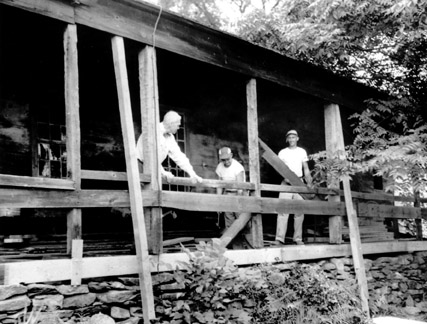Hadley's Revolution
In celebration of Independence Day, a cursory glance at the Porter Phelps’s (and Hadley’s) involvement in the Revolutionary War certainly seems worthwhile. The family’s participation – and lack thereof – provides valuable insight into the social/political landscape of the Revolution in a small, rural setting in the 18th century.
Perhaps most illuminating is the story of Caesar Phelps, an enslaved person at the House, and his service at Fort Ticonderoga. Despite being a prominent member of the community and nominated to various Hadley Committees pertaining to the war, Charles Phelps, husband of Elizabeth porter Phelps, never faced any fighting because Caesar served in his place. Caesar is documented as writing to Charles from Fort Ticonderoga in September 1776, a now-celebrated site. Though it is theorized that Caesar might have enlisted so as to earn his freedom through service in the war effort, he signed off his letter from Ticonderoga with, “I remain your ever faithful Slave, Cesar Phelps,” suggesting that he did not consider himself free at the time and did not expect that to change. What happened to Caesar after the war is largely unknown due to a dearth of historical records, underlining further the disparity in opportunity between Caesar and Charles.
The story of Caesar illustrates the power and privilege afforded to the Phelps’s of the time: rather than fight and possibly die in a cause that he was said to support, Charles had the ability to leverage his wealth and status and escape real danger. Serving instead on the Committees of Safety and Communication, Charles could more indirectly support the war effort while retaining his health and position of prominence in Hadley society. His absence is especially noted when the involvement of some of his family members is taken into account: on the 29th of November, 1773, Elizabeth’s diary referred to a ‘General Training’ led by her cousin Elisha Porter, who was a Captain in the Massachusetts Militia.
Elizabeth’s diary, though it bears no mention of the Fourth of July even after it became a recognized holiday after the War of 1812, still illuminates the early Revolutionary landscape through its inclusions and exclusions, providing insight into the sentiments that spurred rebellion and the significance of now-idolized events to a rural farming community in Western Massachusetts. She does not remark upon the Stamp or Townshend Acts, nor of the Boston Tea Party. She does, however, make note of the Coercive Acts, passed by Parliament in response to the dumping of the tea, that closed Boston's port and outlawed town meetings. On the 19th of June, 1774 Elizabeth wrote “The People of the Land are greatly threatened with Cruelty and oppression from the Parliament of Great Britain – the port of Boston is now and has been ever since the first day of this month shut up and greater calamities are daily expected.” Soon afterwards, Elizabeth would make note of a particularly harrowing evening that would have certainly been considered among the greater calamities of which she was speaking.
Just two months later, Elizabeth reports a harrowing evening. On the 3rd of September, 1774, Elizabeth writes:
“Saturday just at night my Husband came home from town with terrible news that the army o forces which are stationed n Boston had begun to fight and were coming out into the country spreading desolation wherever they came. The men rallied from all parts, vast numbers ,then for the first time did I in a good measure realize parting with my dear Husband...Distressing night but the Lord is our trust.”
Her entry reveals a number of things, perhaps most importantly the looming fear of retribution and palpable tension between the British and Americans. It also marks Elizabeth’s reckoning with the possibility that she might lose her husband in the war – never a small matter, but especially powerful for someone whose father, Moses Phelps, had died fighting at the Battle of Lake George in the Seven Years’ War. As it turns out, there was no fighting between the British and the Americans that night in Boston or elsewhere, which goes to show the atmosphere of heightened tension and rumormongering that was present in the leadup to the Revolution.
Elizabeth’s diary also reveals her participation in the war effort. She records in her diary a visit to the local tailoress on August 13th, 1775 from whom she learned to make breeches for the military. Equipped with her needle, Elizabeth sewed incessantly to help meet Hadley equipment quotas that clothed the soldiers.
On the 17th of October, 1777, General John Burgoyne of Britain surrendered at Saratoga after having captured Fort Ticonderoga, a major setback for British hopes in the area. Elizabeth writes ecstatically in her diary two days later that “wonderful, wonderful words can’t express our adoration and praise! I desire to fall down in astonishment!” It seems that after this inflection point in the conflict, the war diminishes in Elizabeth’s eyes and does not merit much mention afterwards.
In sum, the papers at the Porter Phelps Huntington Museum paint a picture of Revolutionary America that is insightful and relevant in a multitude of ways. We can see how the family contributed in their various ways – be it sewing or deliberating on town committees. We are offered, too, a glimpse of the electrifying buildup to the Revolution that often created an atmosphere of impending doom. Elizabeth’s worries over her husband’s safety after being roused in the night with rumors of violence in the air exemplify such a feeling. Despite the validity of Elizabeth’s worries, the fact that Charles never saw combat must be noted. Not only did they enslave several people, Charles parlayed his ownership of another human being into an abdication of his duty to serve in the fight for Independence. The service of Caesar Phelps in Charles’s place testifies to the position of power and privilege that the Porter Phelps family had in Hadley, and to their full use of it.
Works Cited:
“Letter from Caesar Phelps to Charles Phelps, Jr,” Revolution Happened Here, accessed July 1, 2021, https://www.revolutionhappenedhere.org/items/show/31.
Phelps, Elizabeth Porter. The Diary of Elizabeth (Porter) Phelps, edited by Thomas Eliot Andrews with an introduction by James Lincoln Huntington in the New England Historical Genealogical Register. Boston: New England Historic Genealogical Society in Porter-Phelps-Huntington Family Papers.
Pongratz, Simon. “Hadley’s Struggle for Independence: The Small Farming Town and Its People in the Revolutionary War.”






